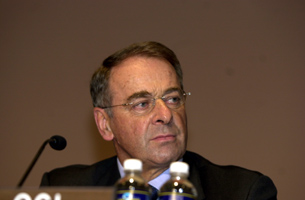|
|
|
|
|
|
|
Highlights for Tuesday, 11 December 2001 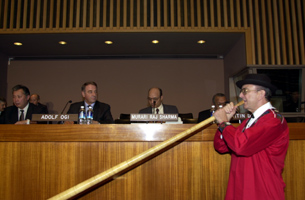 International
Year of Mountains Briefing Note International
Year of Mountains Briefing NoteEditor's Note: This Briefing Note was prepared by Alison Ormsby, alison@iisd.org, for the International Institute for Sustainable Development (IISD). Funding for the preparation of this Note has been provided by The Mountain Institute. Digital photos and streaming audio from the event were prepared by Franz Dejon, franz@iisd.org, and are available at http://enb.iisd.org/crs/mountains/ HTML
version of International Year of Mountains is available at: http://enb.iisd.org/crs/mountains/mountainnote.html
|
|
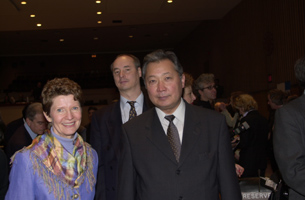 On
11 December 2001, nearly 100 people gathered at the UN Headquarters in
New York to launch the International Year of Mountains. The UN General
Assembly Resolution 53/24 of November 1998 declared 2002 as the
International Year of Mountains (IYM), with the goal of raising
international awareness about mountains, their global importance, the
fragility of their resources, and the necessity of sustainable
approaches to mountain development. The IYM builds on the process
initiated by the 1992 UN Conference on Environment and Development (UNCED),
or the Earth Summit, in Rio de Janeiro, Brazil. Chapter 13 of UNCED's
major outcome, Agenda 21, highlights the urgency for action to achieve
sustainable mountain development. The IYM is intended to reinforce the
implementation of Chapter 13 and initiate new, practical,
grassroots-level action in mountain development and conservation. On
11 December 2001, nearly 100 people gathered at the UN Headquarters in
New York to launch the International Year of Mountains. The UN General
Assembly Resolution 53/24 of November 1998 declared 2002 as the
International Year of Mountains (IYM), with the goal of raising
international awareness about mountains, their global importance, the
fragility of their resources, and the necessity of sustainable
approaches to mountain development. The IYM builds on the process
initiated by the 1992 UN Conference on Environment and Development (UNCED),
or the Earth Summit, in Rio de Janeiro, Brazil. Chapter 13 of UNCED's
major outcome, Agenda 21, highlights the urgency for action to achieve
sustainable mountain development. The IYM is intended to reinforce the
implementation of Chapter 13 and initiate new, practical,
grassroots-level action in mountain development and conservation. |
|
|
OPENING STATEMENTS:
|
|
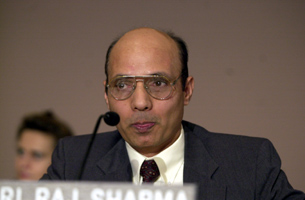 Murari
Raj Sharma, Acting president,
56th session of United Nations General Assembly and permanent
representative from Nepal to the NY UN Mission, on behalf of Han
Seung-soo, Republic of Korea, president of the General Assembly,
expressed hope that the IYM will lead to concrete actions and that the
international community will benefit from the momentum created by the
IYM to ensure true sustainable development of mountains and take
advantage of the 10-year anniversary of the Earth Summit in the same
year. In personal comments, Sharma noted that Nepal is home to eight of
the ten highest mountains in the world and hopes they will provide
inspiration to think big and create the beautiful. He described the many
stresses facing mountains and the urgent need to address these problems
and enhance awareness of the role of mountains in daily life. Murari
Raj Sharma, Acting president,
56th session of United Nations General Assembly and permanent
representative from Nepal to the NY UN Mission, on behalf of Han
Seung-soo, Republic of Korea, president of the General Assembly,
expressed hope that the IYM will lead to concrete actions and that the
international community will benefit from the momentum created by the
IYM to ensure true sustainable development of mountains and take
advantage of the 10-year anniversary of the Earth Summit in the same
year. In personal comments, Sharma noted that Nepal is home to eight of
the ten highest mountains in the world and hopes they will provide
inspiration to think big and create the beautiful. He described the many
stresses facing mountains and the urgent need to address these problems
and enhance awareness of the role of mountains in daily life. |
|
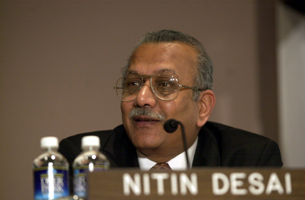 Nitin Desai, Under-Secretary-General for Economic and Social
Affairs, on behalf of Kofi Annan, UN Secretary-General, noted that
mountains provide vital natural resources and are under increasing
risks, including loss of indigenous knowledge and traditions, and noted
the need for effective cross-sectoral cooperation to achieve a balance
between development and preservation. Nitin Desai, Under-Secretary-General for Economic and Social
Affairs, on behalf of Kofi Annan, UN Secretary-General, noted that
mountains provide vital natural resources and are under increasing
risks, including loss of indigenous knowledge and traditions, and noted
the need for effective cross-sectoral cooperation to achieve a balance
between development and preservation. |
|
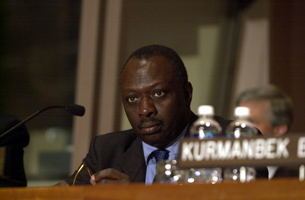 Jacques
Diouf, Director-General, Food and Agriculture Organization (FAO),
commented that, just as a mountain is made of innumerable particles, so
too the IYM has come about from the painstaking efforts of many women
and men. Observing the diversity present, he expressed belief that it
reflects an increasing awareness that we all depend on mountains for
life. He described mountains as both "fragile and fierce, beautiful
and brutal." Noting accomplishments made since UNCED, he emphasized the goal
of IYM, "to ensure the well-being of mountain peoples by promoting
sustainable development of mountain ecosystems" and stated that the
IYM provides an extraordinary opportunity to increase awareness of
mountain ecosystems and cultures. Observing that mountains are the sites
of most of the armed conflicts in the world and some of the most
impoverished people, Diouf said peace and food security are prerequisite
conditions for achieving IYM's goal. Jacques
Diouf, Director-General, Food and Agriculture Organization (FAO),
commented that, just as a mountain is made of innumerable particles, so
too the IYM has come about from the painstaking efforts of many women
and men. Observing the diversity present, he expressed belief that it
reflects an increasing awareness that we all depend on mountains for
life. He described mountains as both "fragile and fierce, beautiful
and brutal." Noting accomplishments made since UNCED, he emphasized the goal
of IYM, "to ensure the well-being of mountain peoples by promoting
sustainable development of mountain ecosystems" and stated that the
IYM provides an extraordinary opportunity to increase awareness of
mountain ecosystems and cultures. Observing that mountains are the sites
of most of the armed conflicts in the world and some of the most
impoverished people, Diouf said peace and food security are prerequisite
conditions for achieving IYM's goal. |
|
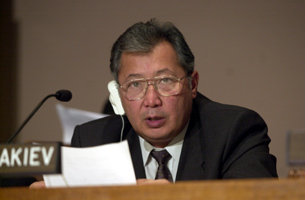 Kurmanbek
Bakiev, Prime Minister, Kyrgyz
Republic, expressed hope that the IYM will foster the elaboration of
strategies on all levels and foster social and economic development and
sustainable use of natural resources. He detailed national programs
adopted by the Kyrgyz Republic for 2002, highlighting the summit that
will be held in Bishkek in the autumn of 2002. Kurmanbek
Bakiev, Prime Minister, Kyrgyz
Republic, expressed hope that the IYM will foster the elaboration of
strategies on all levels and foster social and economic development and
sustainable use of natural resources. He detailed national programs
adopted by the Kyrgyz Republic for 2002, highlighting the summit that
will be held in Bishkek in the autumn of 2002. |
|
|
|
|
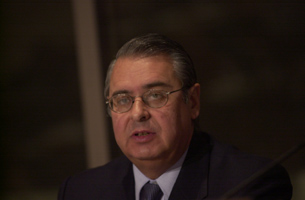 Alan
Wagner,
Ambassador of Peru to the United States and former Minister for Foreign
Relations, on behalf of Diego Garcia-Sayan, Minister for Foreign
Affairs, observed that mountain populations and ecosystems around the
world share similar conditions, including poverty and isolation, and are
sources of water, energy, biodiversity and traditional knowledge. Alan
Wagner,
Ambassador of Peru to the United States and former Minister for Foreign
Relations, on behalf of Diego Garcia-Sayan, Minister for Foreign
Affairs, observed that mountain populations and ecosystems around the
world share similar conditions, including poverty and isolation, and are
sources of water, energy, biodiversity and traditional knowledge. |
|
|
|
|
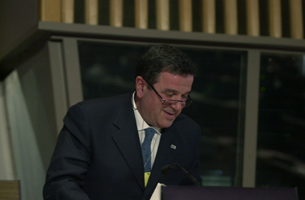 Alberto
Gagliardi,
Under-Secretary of State for Regional Affairs, Prime Minister's
Office, Italy, noted that mountains occupy one fifth of the world's
land area, and Italy's mountain chains represent 54% of its territory
and an important part of Italian identity. Alberto
Gagliardi,
Under-Secretary of State for Regional Affairs, Prime Minister's
Office, Italy, noted that mountains occupy one fifth of the world's
land area, and Italy's mountain chains represent 54% of its territory
and an important part of Italian identity. |
|
|
Gerard
Pfanzelter, Ambassador of
Austria to the UN, on behalf of the Minister for Environment, Austria,
reported that nearly 70% of Austria's landscape is dominated by
mountains, which influence many aspects of culture and daily lives,
including the national anthem that starts with "land of the
mountains." He stated that Austria is eager to share their efforts and
successes, including the development of the Alpine Convention, with
developing countries. |
|
| Louis Besson, Member of Parliament and Mayor of Chambery, and Member, IYM National Committee, France, called for the creation of self-development tools and adoption of legislative and regulatory approaches for mountains. | |
| Jack Ives, Carleton University, Ottawa, representing the Rector, United Nations University (UNU), highlighted research on interactions between highland and lowland systems. | |
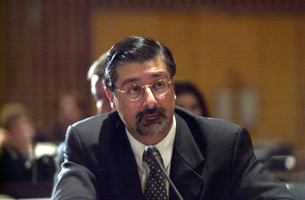 Adnan
Amin,
Director, UNEP Liaison Office, New York, representing the
Executive-Director, explained that the UNEP headquarters in Nairobi has
observed the effects of melting of the Kilimanjaro icecap. He said that
as a result of changes to mountain ecosystems, vital sources of
freshwater are disappearing, and most mountain areas suffer from the
'commons' syndrome. Adnan
Amin,
Director, UNEP Liaison Office, New York, representing the
Executive-Director, explained that the UNEP headquarters in Nairobi has
observed the effects of melting of the Kilimanjaro icecap. He said that
as a result of changes to mountain ecosystems, vital sources of
freshwater are disappearing, and most mountain areas suffer from the
'commons' syndrome. |
|
|
PANEL
DISCUSSION AND DEBATE: Nitin Desai chaired presentations on the conditions for sustainability in mountain development. |
|
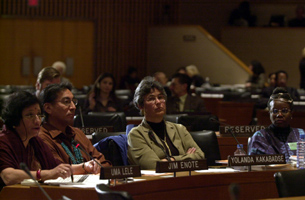 Uma Lele, (far left) Senior Adviser, World Bank, posed the challenge, what can be accomplished within the IYM one-year time period in the face of long-term problems? |
|
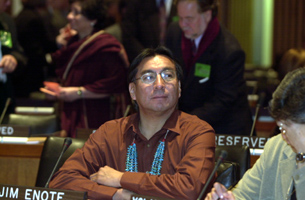 Jim
Enote,
tribal member representing the Zuni Nation, Native American Nation,
detailed his activities on a typical morning that he stated is probably
echoed in many parts of the world, and proposed that his interpretation
of reality and beliefs are also duplicated around the world, where there
are many ways of knowing mountains. His people believe that mountains
are where cloud beings live and if people are deserving, water will
come. Jim
Enote,
tribal member representing the Zuni Nation, Native American Nation,
detailed his activities on a typical morning that he stated is probably
echoed in many parts of the world, and proposed that his interpretation
of reality and beliefs are also duplicated around the world, where there
are many ways of knowing mountains. His people believe that mountains
are where cloud beings live and if people are deserving, water will
come. |
|
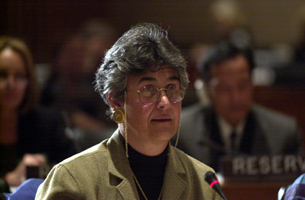 Yolanda
Kakabadse,
President, World Conservation Union (IUCN), noted that she is from the
mountains of Ecuador where people think of lakes and mountains as gods
and goddesses. Yolanda
Kakabadse,
President, World Conservation Union (IUCN), noted that she is from the
mountains of Ecuador where people think of lakes and mountains as gods
and goddesses. |
|
| Bruno Messerli, University of Berne, Switzerland, praised the progress made in the mountain agenda in the 10 years since Rio. He challenged the statistic claiming that ten percent of the world's population lives in mountain areas, saying that new research models have found that 26 percent of the world's population lives on or within 50 kilometers of mountains. | |
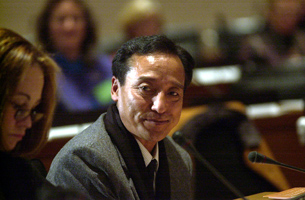 Lhakpa
Sherpa,
Manager, Qomolangma Conservation Programme, The Mountain Institute, on
behalf of the communities he works with, urged active involvement of
mountain people in implementing mountain activities in 2002, because in
the past the concerns of mountain people were largely ignored. Lhakpa
Sherpa,
Manager, Qomolangma Conservation Programme, The Mountain Institute, on
behalf of the communities he works with, urged active involvement of
mountain people in implementing mountain activities in 2002, because in
the past the concerns of mountain people were largely ignored. |
|
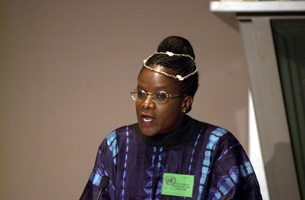 Monica
Opole,
Centre for Indigenous Knowledge Systems and Products (CIKSAP), Kenya,
explaining her work with native plants, urged people-centered solutions
to forest degradation, stating that gene banks, frozen libraries, and
museums are not effective strategies. Monica
Opole,
Centre for Indigenous Knowledge Systems and Products (CIKSAP), Kenya,
explaining her work with native plants, urged people-centered solutions
to forest degradation, stating that gene banks, frozen libraries, and
museums are not effective strategies. |
|
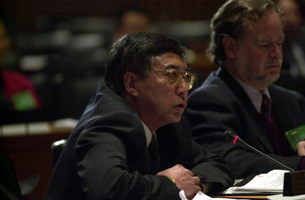 Hugo
Li Pun, Deputy
Director-General, International Potato Center (CIP), Peru, identified
agriculture as a key income generation activity in mountain areas. He
outlined efforts to improve water conservation and harvests, and called
for strengthening of efforts to preserve genetic diversity of main food
crops and achieve food security. Hugo
Li Pun, Deputy
Director-General, International Potato Center (CIP), Peru, identified
agriculture as a key income generation activity in mountain areas. He
outlined efforts to improve water conservation and harvests, and called
for strengthening of efforts to preserve genetic diversity of main food
crops and achieve food security. |
|
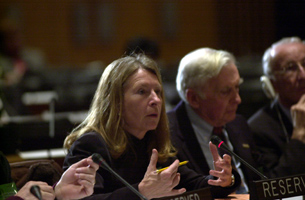 Bernadette
McDonald, Vice President, Banff
Centre, Canada, touched upon the variety of reasons people value
mountain areas and called for the sharing of information and
experiences. She announced that her centre will host a symposium on
earth sciences in mountain regions in October 2002 focusing on the
challenges and influences of extreme landscapes. Bernadette
McDonald, Vice President, Banff
Centre, Canada, touched upon the variety of reasons people value
mountain areas and called for the sharing of information and
experiences. She announced that her centre will host a symposium on
earth sciences in mountain regions in October 2002 focusing on the
challenges and influences of extreme landscapes. |
|
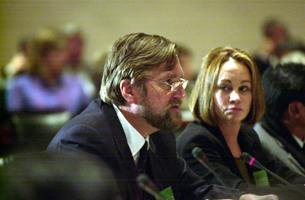 Gabriel
Campbell,
Director-General, International Centre for Integrated Mountain
Development (ICIMOD), Nepal, observed that we all rely on mountains and
are affected by them, we all live downstream and upstream, yet there is
a disproportionate level of poverty and conflict in mountain areas. Gabriel
Campbell,
Director-General, International Centre for Integrated Mountain
Development (ICIMOD), Nepal, observed that we all rely on mountains and
are affected by them, we all live downstream and upstream, yet there is
a disproportionate level of poverty and conflict in mountain areas. |
|
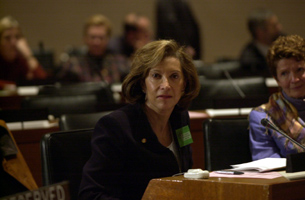 Faanya
Rose, President, Explorers
Club, explained that the club is a multi-discipline organization,
including a focus on mountains and conservation. She expressed that it
is critical that local people are involved in initiatives to achieve
poverty eradication, noting that we have to apply the human touch to
conservation or there will be nothing left to explore. Faanya
Rose, President, Explorers
Club, explained that the club is a multi-discipline organization,
including a focus on mountains and conservation. She expressed that it
is critical that local people are involved in initiatives to achieve
poverty eradication, noting that we have to apply the human touch to
conservation or there will be nothing left to explore. |
|
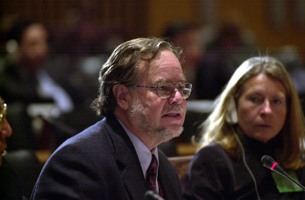 Alejandro
Camino,
Secretary, Mountain Forum, invited participation in the Mountain Forum,
an international organization with 3000 members from over 100 countries
and 150 institutions, a network of networks that is open and free and
conducts activities around the world representing all sectors. Alejandro
Camino,
Secretary, Mountain Forum, invited participation in the Mountain Forum,
an international organization with 3000 members from over 100 countries
and 150 institutions, a network of networks that is open and free and
conducts activities around the world representing all sectors. |
|
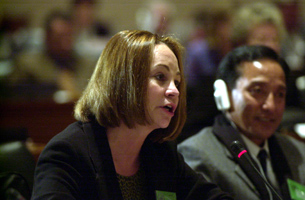 Catharine
Cooke, President and
CEO, The Mountain Institute (TMI), saluted immediate past TMI president
Jane Pratt for her work in coordinating the IYM. Catharine
Cooke, President and
CEO, The Mountain Institute (TMI), saluted immediate past TMI president
Jane Pratt for her work in coordinating the IYM. |
|
| Larry Hamilton, Commission for Mountains, IUCN, urged participation to carry the mountain agenda forward in upcoming events, including: the international year of ecotourism (also 2002); the international year of freshwater and IUCN's World Parks Congress in 2003; and the Convention on Biological Diversity's 7th Conference of Parties in 2004 that will consider mountains. | |
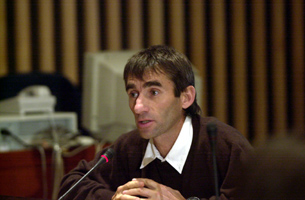 Erhard
Loretan,
climber of the world's highest mountain peaks without oxygen support,
called for the need to define poverty vis
a vis happiness, and expressed his opinion that the small number of
mountain residents is not afraid to come to grips with big problems Erhard
Loretan,
climber of the world's highest mountain peaks without oxygen support,
called for the need to define poverty vis
a vis happiness, and expressed his opinion that the small number of
mountain residents is not afraid to come to grips with big problems |
|
 In
closing, Chair Adolf Ogi thanked everyone involved, particularly the
Kyrgyz Republic for starting the IYM initiative, and expressed his
conviction that this launching is the first in a long series of events
to be held around the world in 2002. In
closing, Chair Adolf Ogi thanked everyone involved, particularly the
Kyrgyz Republic for starting the IYM initiative, and expressed his
conviction that this launching is the first in a long series of events
to be held around the world in 2002. |
|
| INTERVIEW: | |
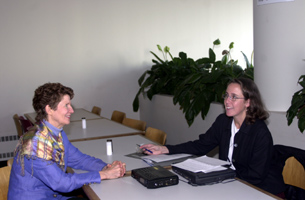 |
|
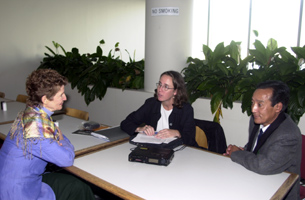 |
|
| MISCELLANEOUS PHOTOS: | |
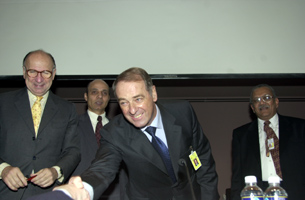 |
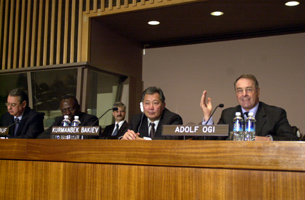 |
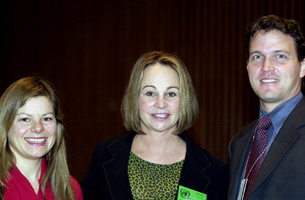 |
 |
|
|
|
To view PDF files, you will need the free Adobe Acrobat Reader: |
To listen to Real Audio files, you will need the free Real Audio player |
| | Linkages home | E-Mail | | |



